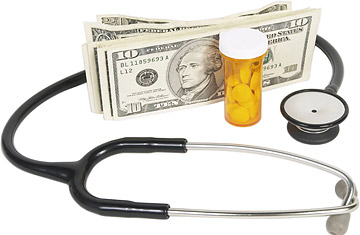
Should doctors be paid extra for doing the right thing? The Hippocratic Oath aside, money goes a long way in coaxing doctors to provide better care — and health insurers are increasingly providing financial incentives that do just that. But while insurers forecast that cash bonuses will improve quality of care and lead to future cost savings, some experts question whether patients will win out in the end.
Corporate America has long doled out bonuses to employees who do the best work. Such pay-for-performance programs have only recently caught on in the health care industry, but caught on they have — more than half of U.S. health plans, including Medicare, report offering some type of incentive pay to doctors and hospitals for meeting certain basic standards of care, such as encouraging annual mammograms or reducing the rate of hospital-acquired infections. The small bonuses typically amount to 10% of physicians' annual salaries or less, but studies demonstrate that they can dramatically improve the services doctors provide. "Offering doctors and hospitals more money encourages them to do a better job," say Leah Binder, CEO of the Leapfrog Group, a nonprofit consortium of major health care buyers such as General Motors. "We've already employed that logic to every other area of business. Why not health care?"
For starters, a bonus-pay system could help reduce medical errors. Such errors are associated with an estimated 100,000 unnecessary deaths in the U.S. each year, and cost the health care system as much as $30 billion annually. Binder and others argue that currently there's little motivation for doctors to reduce such errors: Insurers typically reimburse medical providers according to the number of patients they see, rather than the quality of care they deliver. It's a payment structure riddled with problems. "Under the status quo, doctors get paid if they make a mistake," says Dr. Richard Neubauer, chief of internal medicine at Alaska Native Medical Center in Anchorage and a member of the American College of Physicians' ethics committee. "Then they get paid a second time for correcting that error. It makes very little sense."
In the absence of systematic reform, many insurers have turned to pay-for-performance programs to try to improve quality of care, and cut costs along the way. Early efforts have shown positive signs. In the first three years of an ongoing pay-for-performance demonstration project led by the Centers for Medicare and Medicaid, more than 250 participating hospitals were assessed in five clinical areas. The hospitals performing in the top quintile received bonuses of an unspecified amount. In findings released in January, researchers following the project concluded that quality scores in the five measured clinical areas had improved on average 17%, and costs had been reduced $1,000 per patient on average. Researchers estimated that if all American hospitals adopted similar bonus schemes, we could save 70,000 patient lives per year and $4.5 billion in hospital costs annually.
Meredith Rosenthal, a Harvard health economist, published a report in the Journal of the American Medical Association in 2005 also finding that medical care improves under pay-for-performance projects. But while Rosenthal strongly supports such initiatives, she says it's imperative that they're designed properly. For example, she notes that most programs reward health providers for being the top performers in a particular field — but not for relative improvement. "Right now we're offering bonuses to A+ performers, when most doctors are delivering at a B-minus level," Rosenthal says. "Without an incentive to [improve], most doctors won't bother."
Another concern is, how much incentive pay is enough. There is no universal standard to determine which measures qualify for bonus pay — or how much — so some doctors end up filling out a lot of paperwork to comply with different insurance plans. The administrative costs often outweigh any financial benefit they see for pursuing improvements. "If health plans want physicians to participate, they'd be much better off collaborating beforehand to set norms," says Hindy Shaman, director of health industries for the consulting firm PricewaterhouseCoopers. "Doctors won't waste their time if they have to fill out 20 different forms."
The jury is also still out on whether pay-for-performance plans ultimately benefit patients. On one hand, Shaman says that if doctors' performance measures were standardized and made available, patients could become better consumers of medicine. But, on the other, Neubauer worries that some patients could be denied necessary care under the new regime. "A doctor may just decide not to see a difficult patient who brings down his averages on certain measures," Neubauer says.
There's at least one undeniable benefit of pay-per-performance programs: they're forcing doctors and hospitals to pay closer attention to quality controls. Rosenthal points to diabetes care as an example. "Doctors may not yet be convincing every patient to have their blood sugar tested annually," she says. "But at least now [they're more aware of] which patients need to be tested." So while pay-for-performance may be an imperfect solution in an imperfect system, she adds, "At least it's a step in the right direction."
